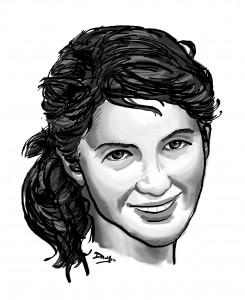I promised myself I would never write an opinion piece about the Middle East, but I’m about to break my own rule.
In the last few weeks, we have seen the Egyptian president grant himself extra-judicial powers, effectively making himself invulnerable. We have watched as hostilities between Gaza and Israel developed. We have witnessed the Syrian government continue to kill its people.
Part of the tragedy of these unfolding dramas is the fact that we’ve seen them before.
[media-credit id=8398 align=”alignleft” width=”245″] [/media-credit]
[/media-credit]
Egyptians overturned their last government because of its autocratic, self-perpetuating policies. Israel and Gaza have dueled before — more than once. And this is by no means the first massacre of Syrian citizens by their government.
There are many reasons I find these situations appalling — most importantly that people are losing their lives and their rights, or are in danger of losing them, around the region. But my sense of outrage also stems from a feeling of protectiveness and fear.
For two of the last three summers, I worked as a counselor at Seeds of Peace, a summer camp that teaches conflict resolution and coexistence to young people from the Middle East and South Asia. For weeks at a time, I lived with — and came to love — hundreds of campers who are now back in Tel Aviv, Gaza and Cairo. My campers are extraordinary teenagers: leaders in their communities who worked relentlessly at camp to understand the perspective of the other side. At camp, it is far easier to be friends with people on the opposing side of the conflict than it is at home.
At the end of the program, putting my campers on the buses that would take them to the airport was one of the hardest things I’ve ever had to do, as I knew how volatile the regions and the cities that I was returning them to are. I worry about them. One of my worst fears is waking up to a message that one of my campers had been hurt or killed. But that is the reality that they face — and we face from a distance — every day: violence, continued hostility, no end to the conflict in sight.
Seeds of Peace has existed for the past 19 summers. The Israeli-Palestinian conflict in its current iteration has existed for decades more. Egypt and Syria’s problems with autocratic leadership stretch back centuries, and are reinforced by the specter of colonialism that haunts us still. Renewed fighting or violence no longer surprises us: We have come to expect it, to wait for it, and when it unfolds, we can barely bring ourselves to watch.
We are tired of these conflicts, tired of hearing about them. The people in the region are much, much more tired of suffering the consequences of bad leadership and perpetual fighting, political and physical. The next generation of leaders — my campers — are inheriting a mess begetting messes.
The solution is not simple, it’s definitely not easy and it’s only tangentially political.
We can’t expect an end to conflict in a region that continues to be economically underdeveloped and socially divided, where the vast majority of people have limited access to education and health care. Many countries in the region remain crippled by poor infrastructure: bad roads, crumbling buildings, limited access to technology. And don’t even get me started on the place of women in Middle Eastern society.
In order to ensure an end to conflict in the Middle East, and in order to avoid waking up every morning to bloody headlines, we have to help build a better Middle East: one in which everyone who wants a job has one, all children (including girls) are educated and all citizens have access to the resources they so desperately need. We’ve known for a long time that the solution to problems in the region isn’t just imposing democratic practices, or forcing two sides to sign a treaty. Treaties can be broken — and we need only look at Egypt to see how fragile democracy is. The solution is enacting social and economic change in the region, and empowering citizens to demand and build a better world for themselves.
Someday, I’d like to send campers home to lives that aren’t clouded and constrained by fear, anger and lack of opportunity. I’d like to put them on a bus confident that I’ll never be woken up in the night by the message I dread — the message, I’m afraid, that is coming, if we can’t promote permanent, sustainable change soon.
Zoe Mercer-Golden is a senior in Davenport College. Her column runs on Wednesdays. Contact her at zoe.mercer-golden@yale.edu .







